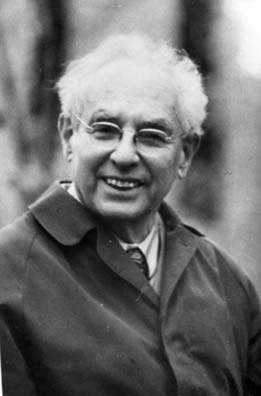Alexander Luria
From Psy3242
Carson3816 (Talk | contribs) |
|||
| Line 1: | Line 1: | ||
[[Category:Neuropsychological profiles]] | [[Category:Neuropsychological profiles]] | ||
<STRONG><H2>Alexander Luria:</H2></STRONG> | <STRONG><H2>Alexander Luria:</H2></STRONG> | ||
| - | <STRONG><H3>Background</H3></STRONG><BR> | + | <STRONG><H3> |
| + | == Background == | ||
| + | </H3></STRONG><BR> | ||
Alexander Luria, born in a city east of Moscow named Kazan, attended Kazan State University (graduated in 1921) and the 1st Moscow Medical Institute (graduated in 1937). He later become a professor and received two more degrees by the year of 1943. During these years, Alexander helped to assemble the Faculty of Psychology at the Moscow State University where he was later named head of both the pathopsychology and neuropsychology studies.<BR> | Alexander Luria, born in a city east of Moscow named Kazan, attended Kazan State University (graduated in 1921) and the 1st Moscow Medical Institute (graduated in 1937). He later become a professor and received two more degrees by the year of 1943. During these years, Alexander helped to assemble the Faculty of Psychology at the Moscow State University where he was later named head of both the pathopsychology and neuropsychology studies.<BR> | ||
| - | <STRONG><H3>Accomplishments</H3></STRONG><BR> | + | <STRONG><H3> |
| + | == Accomplishments == | ||
| + | </H3></STRONG><BR> | ||
Through constant communication with Sigmund Freud and worke with reaction times and thought processes, Luria helped to develop the first lie detector machine in 1932.<BR> | Through constant communication with Sigmund Freud and worke with reaction times and thought processes, Luria helped to develop the first lie detector machine in 1932.<BR> | ||
| Line 10: | Line 14: | ||
During World War II, Luria worked with a team of doctors in an army hospital treating wounded patients with brain lesions. The end result of these actions is the development of the area now formally known as neuropsychology.<BR> | During World War II, Luria worked with a team of doctors in an army hospital treating wounded patients with brain lesions. The end result of these actions is the development of the area now formally known as neuropsychology.<BR> | ||
| - | <H3><STRONG>Tests Created by Alexander</STRONG></H3 | + | <H3><STRONG> |
| - | The Luria-Nebraska test is one based on the scales of neuropsychological functioning. This test is designed for patients 15 years of age and older, but it can be administered to children as young as 12 years of age.<BR> | + | == Tests Created by Alexander == |
| + | </STRONG></H3> | ||
| + | The Luria-Nebraska test is one based on the scales of neuropsychological functioning. This test is designed for patients 15 years of age and older, but it can be administered to children as young as 12 years of age. | ||
| + | <BR> | ||
http://luria.ucsd.edu/bwl.jpg | http://luria.ucsd.edu/bwl.jpg | ||
Revision as of 22:38, 23 April 2008
Contents |
Alexander Luria:
Background
Alexander Luria, born in a city east of Moscow named Kazan, attended Kazan State University (graduated in 1921) and the 1st Moscow Medical Institute (graduated in 1937). He later become a professor and received two more degrees by the year of 1943. During these years, Alexander helped to assemble the Faculty of Psychology at the Moscow State University where he was later named head of both the pathopsychology and neuropsychology studies.
Accomplishments
Through constant communication with Sigmund Freud and worke with reaction times and thought processes, Luria helped to develop the first lie detector machine in 1932.
Luria also traveled to Central Asia during the years of the 1930's where he studied the psychological changes of memory, perception and problem solving in relation to the educational development in of an undereducated people. Working heavily with language, Luria focused on the topic of aphasia (The loss of the ability to understand speech or produce it).
During World War II, Luria worked with a team of doctors in an army hospital treating wounded patients with brain lesions. The end result of these actions is the development of the area now formally known as neuropsychology.
Tests Created by Alexander
The Luria-Nebraska test is one based on the scales of neuropsychological functioning. This test is designed for patients 15 years of age and older, but it can be administered to children as young as 12 years of age.

